Greening LMS are a group of staff and students at the LMS dedicated to improving sustainability within the institute. Since 2019 Greening LMS have made significant strides to making our research more sustainable.
On this page, you can read about some of the key projects they have been involved in.
LMS awarded £65,000 for greening projects
In August 2021 LMS Greening was awarded a combined sum of £65k from the MRC to undertake these three important greening projects.
1. Reusable glass pipettes
The first is aimed at tackling unnecessary plastic and glass waste from individually wrapped serological pipettes.
Individually wrapped serological pipettes are currently our only choice at the LMS, but these are not always necessary, especially for non-sterile work.
The funding has allowed us to purchase reusable, autoclavable glass serological pipettes, and the glass wash and autoclave attachments needed to clean them so that everyone at the LMS can make the switch when possible. Expect to see these in the new building in late 2022.
2. Chemical management software
Our second project aims to reduce unnecessary waste from duplicate ordering of chemicals. With the purchases of Cheminventory licences, each lab will be able to catalogue their chemicals quickly and efficiently.
Better yet, the web-based software allows us to easily share chemicals with other labs, reducing the need to overorder.
We know some labs in our ICTEM building already share a number of chemicals, so this will be a great way to encourage everyone to do the same.
3. Great LMS Greening Competition
Our final project is all about promoting engagement with greening and sustainability at the LMS.
We are currently running the Great LMS Greening competition where labs are competing over February and March to make simple, sustainable changes to their lab practice and be in with the chance of winning great prizes for their team!
Labs can get points just by recycling plastic media bottles and tip boxes, switching PCR programs to 12 degrees, and taking their reusable coffee cups to work.
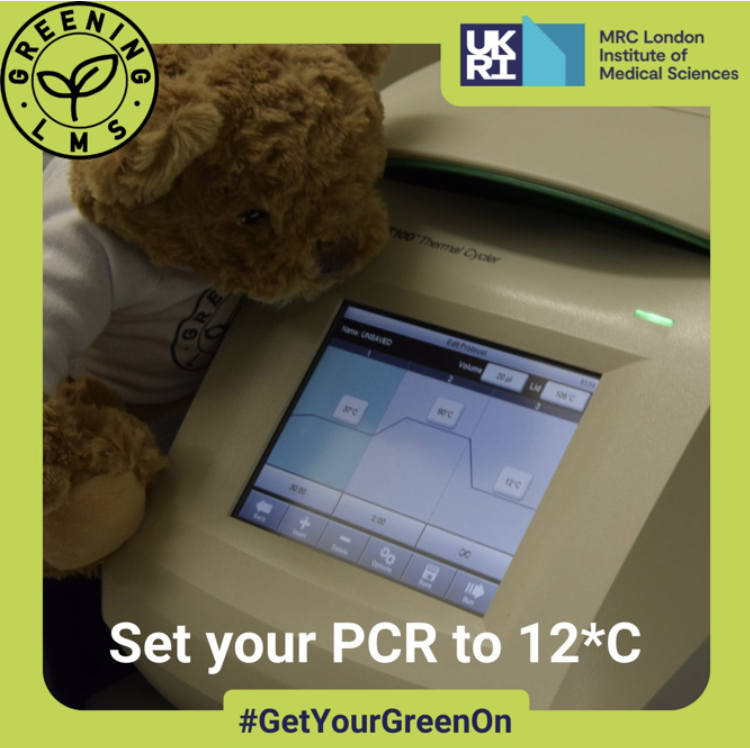
![]()
Greening Survey
To promote two-way engagement, our survey of the LMS community in February 2022 helped us understand what LMS students and staff want most from their greening team. LEAF Silver, going for Gold. 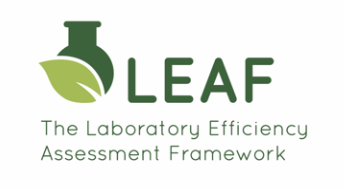
LEAF (the Laboratory Efficiency Assessment Framework) is a sustainability program developed by University College London to standardise sustainability in academia.
In 2019 the LMS was awarded the Silver LEAF award in recognition of our sustainability work.
This involved implementing a range of changes, from increasing awareness through posters and handbooks, providing alternatives to single use plastics and appointing green representatives.
We are aiming to go for the Gold LEAF Award, if you are interested in helping us get there, please let us know.
Freezer challenge: -70°C is the new -80°C
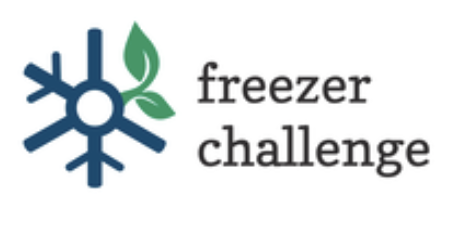
A -80°C freezer can use as much energy as an entire house does in a day. Making the switch to -70°C can save up to 40% of the energy.
Furthermore, accumulating evidence shows -70°C is a safe storage temperature for a variety of biological samples, including genomic DNA, fungal isolates, and plasma antibodies.
Additionally, in the event of power failure, -70°C freezers will only reach -20°C 35 minutes faster than a freezer set at -80°C (Farley et al., 2015). For much more information, visit https://www.freezerchallenge.org/.
In line with many other institutes, we are proposing a shift of all -80°C freezers to -70°C. To take the first step at the LMS we have set two emergency freezers (3rd and 4th floor CRB) to -70°C.
We are currently running a trial where various biological samples will be compared at both temperatures for viability and quality.
New -80° Freezers
In September 2021, the LMS received approximately £60,000 from the MRC Green Group to replace 6 of our oldest -80°C freezers with more efficient, newer models.
Introducing lab green reps
Back in 2019, we introduced a green rep from every lab at the LMS.
The green reps let their lab members know about our greening initiatives, help the rest of the lab run in a more sustainable way, and liaise with us with any questions or ideas for improvement.
If your lab does not have a green rep or if you are interested in being one yourself, please get in touch with Nicola Rodricks.
Clarifying Waste disposal
We have put up these waste disposal posters around the LMS: 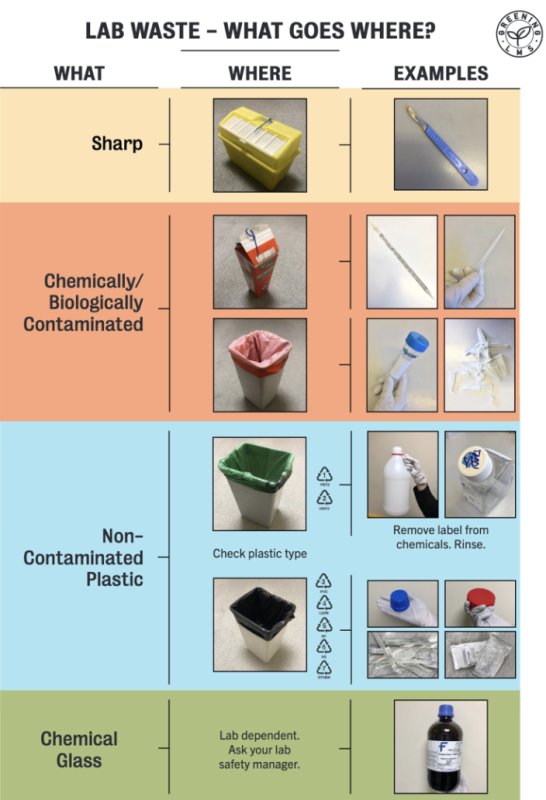
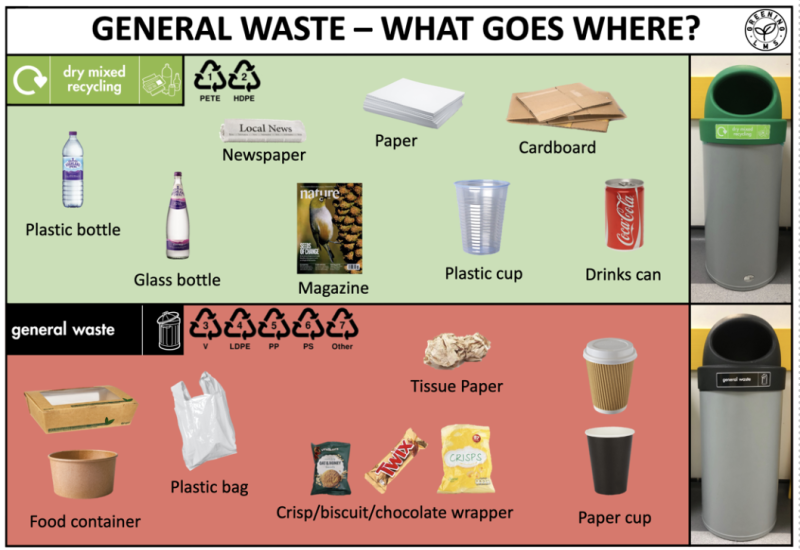 RECYCLING: The following can all be recycled in the mixed recycling bins: type 1 (PETE) and type 2 (HDPE) plastics, cardboard, paper, glass aluminium drinks cans and foil. Many media bottles can be sterilised and recycled rather than thrown in the incinerator bins. All other plastic types (3-7) cannot yet be recycled at the LMS.
RECYCLING: The following can all be recycled in the mixed recycling bins: type 1 (PETE) and type 2 (HDPE) plastics, cardboard, paper, glass aluminium drinks cans and foil. Many media bottles can be sterilised and recycled rather than thrown in the incinerator bins. All other plastic types (3-7) cannot yet be recycled at the LMS.
GENERAL WASTE: Similarly, lots of clean lab waste does not need to go in orange incinerator bags, these can go in general waste. Unless it is chemically or biologically contaminated, there is no need for it to be incinerated (think plastic wrappers for plates, strippetes, bags for falcon tubes etc.) We have provided extra bins for your labs to make this even easier.
Glassware cupboards on each floor
Back in 2019, in collaboration with the glass wash facility, we stocked cupboards on every floor of the CRB and in ICTEM with reusable autoclavable glass and plastic bottles, flasks, beakers and measuring cylinders to make it easy for us all to cut back on unnecessary plastic waste.
For glass bottles, the staff have made it easy to distinguish autoclaved (red cap) from washed (blue cap) bottles to suit your needs. If you can use one of these in your experiments rather than single use plastic, then we encourage you to do so.
Introducing timers for electrical equipment, and ‘turn equipment off’ stickers
Tired of that water bath or heat block being left on overnight or over the weekend?
LMS Greening have plug socket timers that can be set to turn off whenever you like. We also have 3 different stickers to let others know what equipment should and shouldn’t be turned off after use.
Returning polystyrene boxes Certain polystyrene boxes can be returned to companies.
New England Biolabs, Promega, Insight BioTechnology, and Bioline meridian all currently participate in this scheme. To return polystyrene boxes to any of these companies, simply attach a return label to the outside of the boxes and place it your mail area for collection. 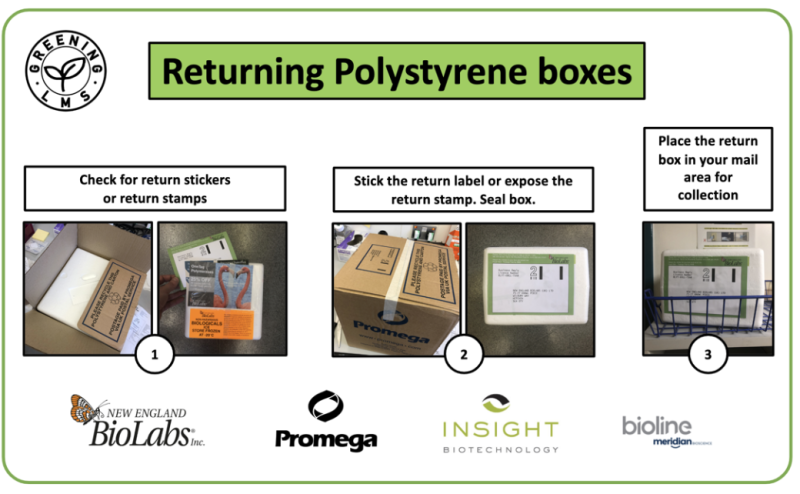
Gas canister recycling
Greening LMS has set up a new initiative to collect and recycle gas canisters.
Usually, pressurised canisters cannot be recycled due to the risk of the remaining gas and end up in landfill. We have set up a collection point under the fume hood in 4021 for canisters to be recycled.
Drop your empty cans off in the labelled box and one of the team will pierce the cans to be safely recycled. If you would like to get involved in this project, we are thinking of setting up a collection point on each floor, so get in touch to discuss new options!
Sustainable Stationary
Recently we have reviewed all the stationary that we supply to staff and students to reduce the impact of non-scientific materials.
We have now swapped where possible to suppliers which are certified by the Blue Angel label or are recyclable and come from recycled initiatives.
Recyclable paper in printers
In collaboration with LMS Estates, Greening LMS has pioneered the introduction of recycled paper for all of our printers. Previously, the paper used by the institute was from virgin trees in Brazil, which has now been swapped with a recycled alternative.
Encouraging ‘green behaviours’ around the LMS You may have seen our posters encouraging you to turn off computer monitors when not in use, take the stairs instead of the lift, or boil only the water you need. 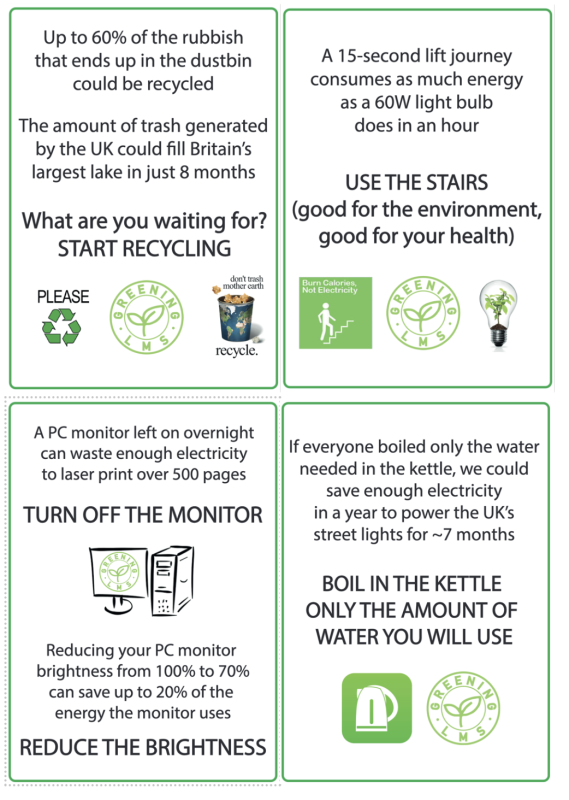 Collaborating with the MRC Green Group
Collaborating with the MRC Green Group
In 2021, the MRC created a green group to work together on environmental strategies across the MRC. We take part in group meetings involving MRC head office, MRC Harwell, MRC LMB and the Crick to share ideas and address challenges in lab sustainability.
Greening LMS News Introducing the LMS’s first Sustainability Officer LMS secures funding to support sustainability projects 4 ways that we are making our labs more sustainable Resources by Greening LMS
- MRC LMS Top Tips to Reduce Lab Waste
- Greening LMS – Past and Current Projects
- Contact our Sustainability Officer, Nicola Rodricks.
Resources from other Institutes
